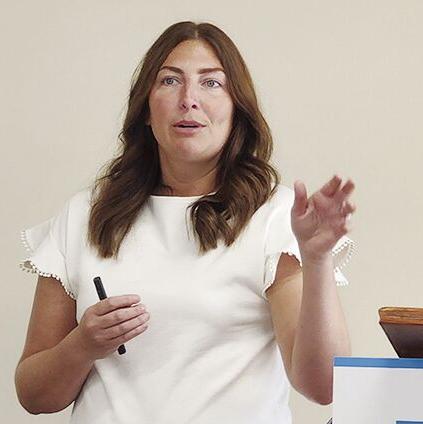AuSABLE Twp. – Develop Iosco (DI) held its third quarter meeting at AuSable Township hall on Thursday, Sept. 19.
The featured speaker was Lindsey Clark (formerly Miller) senior community development manager with the Michigan Economic Development Corporation (MEDC).
Clark spoke about the importance of attaining Redevelopment Ready Community (RRC) status and funding available to municipalities that have attained the status through MEDC. According to Clark’s presentation, MEDC supports the “growth of vibrant, diverse, and resilient communities across Michigan.”
Clark spoke about the Public Spaces/Community Places crowd funding opportunity available that has been in existence for the past 10 years. A 60-day online fundraising campaign is used to raise funds for a project. MEDC will match the funds up to $50,000 if the crowdfunding goal is reached. Additional information can be found at patronicity.com/PureMichigan.
Plainfield Township Supervisor Fred Lewis reported that Oscoda Township had used the match from MEDC for Phase 3 of the bike path as well as Transportation Alternatives Program (TAP) and Michigan Natural Resources Trust Fund (MNRTF) funding.
Clark mentioned pickleball courts and mural festivals as some of the eligible projects.
MEDC provides gap funding, in the form of grants and loans, needed to complete a project. Some of the criteria that impact funding decisions are whether or not a project is in the Master Plan, the local impact of the project, the location and the financial commitments that have been made.
Clark provided the City of Cheboygan as an example of a community that she described as a “ghost town” seven years ago. Today the downtown is a vibrant area with thriving breweries and restaurants. Funding was obtained through the Main Street program.
Clark also mentioned the assistance that is available through the Northeast Michigan Council of Governments (NEMCOG) to update zoning and master plans. As reported, both AuSable and Oscoda townships received the $50,000 grant from the Michigan State Housing Development Authority (MSHDA). AuSable Township is using the funding to work with NEMCOG to rewrite its Master Plan.
Clark said there are fellows available to work with municipalities that are interested in becoming RRC certified.
Oscoda Community Development Director Nancy Howse reported that the township pursued RRC certification during the COVID-19 pandemic so the process took over two years. East Tawas City Manager Brent Barringer said it took several years but that the process was very helpful.
Clark described a project in Rogers City where a blighted building that was an old school was renovated into community space and apartments. Clark also described housing projects in Alpena for students and seniors.
MSHDA has a number of housing initiatives including the “Missing Middle” and “Build My Neighborhood” that includes the development of apartments, townhouses, and single family homes.
Lewis mentioned that funding is needed to extend the Iosco Exploration Trail through Baldwin Township and that $300,000 to $350,000 is needed for engineering.
MEDC has the following grants available:
• Build MI Community Program – The Build MI Community (BMC) grant is an initiative designed to promote private investment by emerging developers with limited real estate development experience who are looking to become future developers. Grant ranges between $50,000 — $250,000. Maximum award equal to the lesser of 50% of the eligible project costs or $250,000.
• Community Revitalization Program – The focus of the Michigan Community Revitalization Program (MCRP) is to encourage and promote the rehabilitation and redevelopment of brownfield and historic preservation sites located in traditional downtowns. The MCRP provides up to $1.5 million in funding.
• Match on Main is a $25,000 grant for businesses that are located in a downtown area in a municipality that has attained Redevelopment Ready Community status. Both Oscoda Township and East Tawas have attained RRC status. The 2025 grant application, that is submitted by the municipality, will be available in early 2025. After the meeting Clark reported that there would be a new application for the Match on Main grant in 2025.
• Revitalization and Placemaking (RAP) provides access to gap financing for place-based infrastructure development, real estate rehabilitation and development, and public space improvements. A total of $4.5 million has been allocated to the northeast Michigan region. According to the MEDC website, RAP grants are currently available for real estate redevelopment projects and can be applied for as funds become available. The program guidelines and application are available on the RAP webpage.
Performance based grants for public space place-based infrastructure and façade program implementation will be available in fiscal year 2025 through a competitive grant process. The application window is anticipated to be November 2024-January 2025. A RAP program application webinar is scheduled for Nov. 13, registration is available on the RAP webpage.
More information on programs can be found on MEDC’s webpage at miplace.org/programs/. To sign up for MEDC newsletters, go to the MEDC Preference Center.



